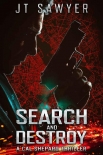Search and Destroy JT Sawyer (books to read in your 30s txt) 📖

- Author: JT Sawyer
Book online «Search and Destroy JT Sawyer (books to read in your 30s txt) 📖». Author JT Sawyer
“Shepard was my idea. Once Burke described his need for someone with real-world field experience in covert activities, I got the go-ahead from Director Begley to assign one of my field agents to Perseus to help fill in the gaps of what goes on from a strike team’s perspective, minus any classified details, of course.”
“What’s Shepard’s background? I assume if he was with you then he was SAD…before your change of station back to the States because of your medical issues,” said Rourke in a condescending tone.
Patterson let his stare linger on the man before continuing. “I recruited and trained him myself back when I was still in field ops. Shepard was top of his class at Arizona State University and graduated with record scores from the Farm, after which he began working for SAD under me. Since then, he’s run missions in numerous theaters abroad and eventually headed up the Special Activities Division SD unit.”
“That’s a new one on me. Can you explain, or is that above Mr. Burke’s paygrade?” said Gardner.
Patterson nodded knowingly up at Burke then looked back over at the others. “SD—search and destroy. They’re a five-man team consisting of the best of the best, SAD operatives whose sole aim is to hunt down and neutralize other assassins. The SD program was started by myself and Colonel Ryan Foley, who was a former Green Beret.”
“Foley was the one who headed up that rescue op in Somalia with the kidnapped American journalists a few years ago, wasn’t he?” said Gardner.
“That’s correct,” replied Patterson. “Shepard was also involved in that mission.”
“As I recall, there weren’t many pirates left along the coast in that region after Foley and his team were done,” said Begley.
Patterson nodded, continuing. “With Shepard back in the States last year rehabbing a shoulder injury, he was the perfect fit for Perseus.”
Burke folded his arms. “Agent Shepard was an indispensable part of my work, and Perseus wouldn’t be what it is today without him. I feel like his thought matrix is interwoven into the software.”
“OK, you’ve just read to me from the shiny brochure on the rack; now let’s see what we paid for,” said Begley, placing both his palms on the table and glancing up at the screen, anxiously awaiting the next slide.
Burke motioned to the PowerPoint screen. “I’ve brought a sampling of the results, which I’ll run through now, but Perseus is going through the finishing touches as we speak and will be ready to be handed over to the DOD shortly.”
“Then why the hell are we here?” said Begley, who was clearly expecting to see something tangible to explain the multi-million-dollar expenditure he had signed off on to create Perseus.
“Today’s meeting is related to a slight anomaly that was detected when I did a test run on the software last week.”
He pulled up a satellite image of Venezuela, zooming in on an intersection two blocks from the center of downtown Caracas. He scrolled over to a ten-foot-by-ten-foot blacked-out square of the alley behind a café.
“Do you see this area that looks like it’s in the shade? That is not created naturally by trees, an awning or a passing plane. That was intentionally done by someone else, and the only thing I know of that would create that is a high-intensity infrared beamed aimed on that section of sidewalk from a rooftop or apartment above at the very time that Perseus was scanning the city.”
“We’ve seen that before with drone footage when Al Qaeda needed to blot out a small region around a village where someone was about to make an exchange for weapons or cash,” said Patterson. “I’ve not heard of that occurring in South America though.”
“Nor have I,” said Gardner from the computer monitor. “And it’s not like Caracas is a hotbed for jihadists, not now anyway.”
“Regardless, Perseus is trained to pick out aberrant patterns or disruptions in the political and economic structure of a country that could be tied with an attempt on a high-value political target. It clearly zoomed in on that city block for a reason. That it detected something in Caracas that is often associated with known terrorist tactics in the Middle East may be of concern.” He homed in on a grainy image of a man in a white shirt and tan cargo pants who was on the street corner three blocks away.
“I ran the images of the pedestrians in a four-block radius through Perseus before and after 0530 that morning, and only one individual was flagged as being a person of interest.”
He enhanced the area around the man’s face. “Perseus compared the spacing between his nose and chin with a previous photograph of the man from the eighties that was in the CIA’s database, along with comparing the height of his cheekbones to that photo. The match was 100%.” An Interpol record popped up in the upper-right corner of the screen, showing a mugshot of a bearded figure in his late fifties.
“This is Major Carlos Montoya. He ran a death squad in Nicaragua in the late eighties, eliminating dissidents and journalists opposed to the newly installed government. Later, he was involved in a number of guerrilla movements in several Latin American countries in the decades following, mostly assassinations of political activists. Eventually, he found his way down to Colombia, where he was the chief enforcer for the Carmesi Cartel, then he fell off the radar a few years ago…until last week.”
“Death squads—weren’t those CIA-sponsored units back when you guys were into monthly regime changes down south?” said Rourke as he glared at Patterson.
“Different times and different administration,” said Patterson. “But as I recall, the NSA provided the widespread phone tap violations on dignitaries in Central America that gave our intel agencies a black eye once word got out.”
Burke cleared his throat then stared up at the mugshot. “It’s not hard to ascertain that the appearance of this rogue mass murderer coincides with the visual glitch on that other street corner and





Comments (0)